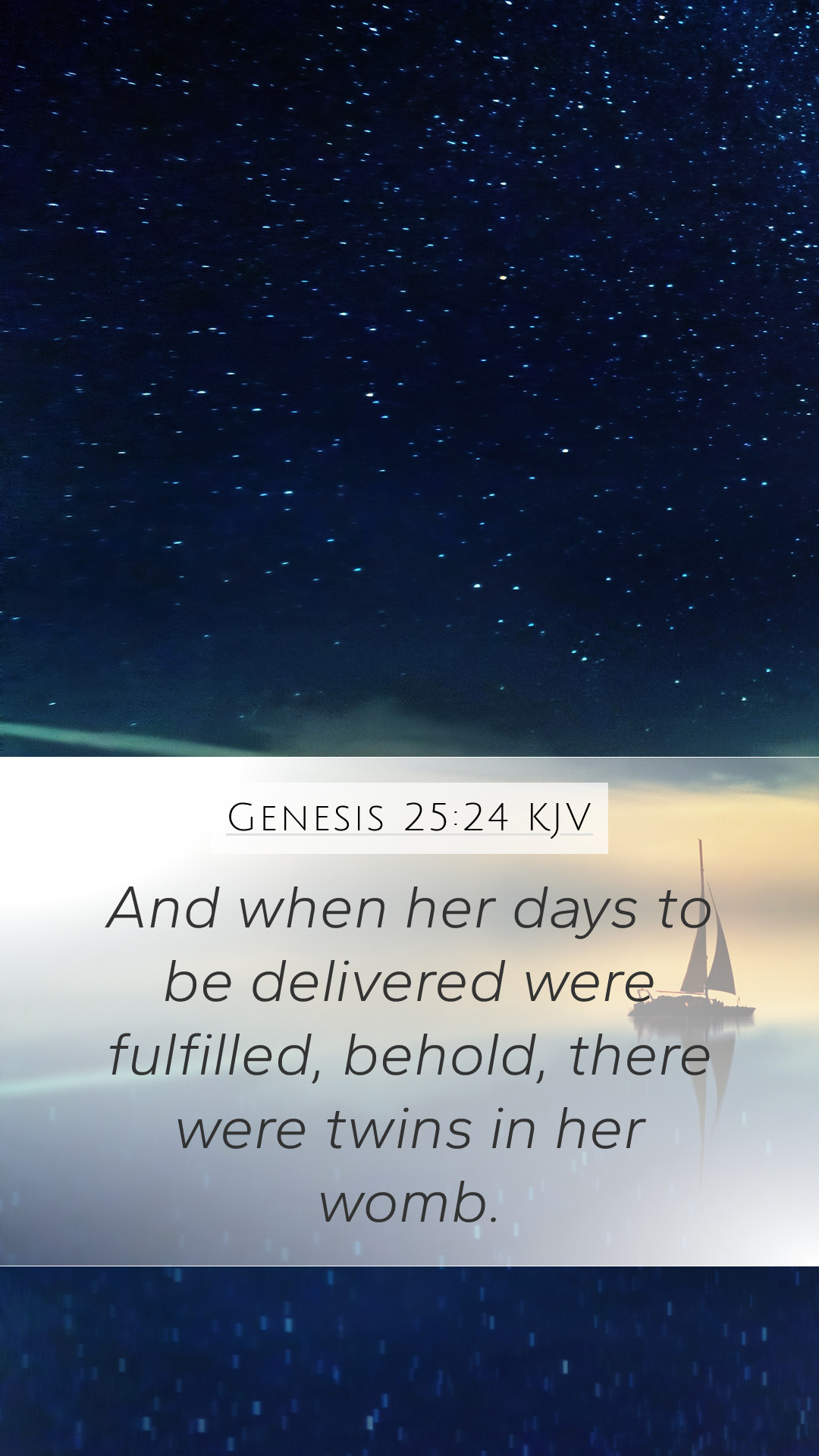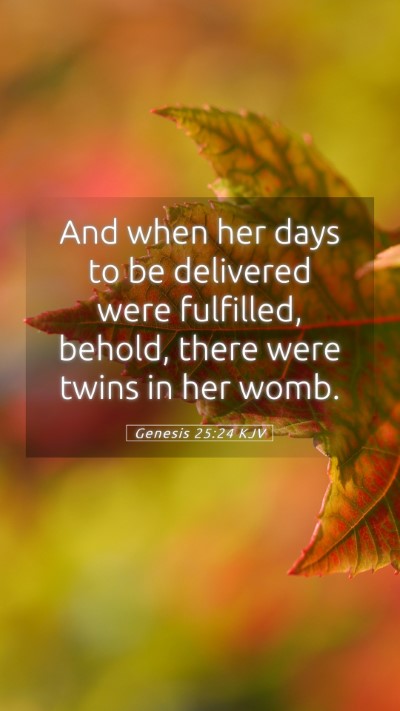Understanding Genesis 25:24
Verse: Genesis 25:24 — "And when her days to be delivered were fulfilled, behold, there were twins in her womb."
Introduction
The birth of twins in Genesis 25:24 marks a significant moment in the lineage of the patriarchs. This verse conveys much about the dynamics of family, God’s plans, and the unfolding narrative of Israel’s ancestors. Here, we will delve into various commentaries to provide a comprehensive biblical exegesis of this passage.
Bible Verse Meanings
This verse depicts the culmination of Rebekah's pregnancy, a pivotal moment that sets the stage for the rivalry between her two sons, Esau and Jacob. Several public domain commentaries shed light on this significant event:
-
Matthew Henry:
Henry emphasizes the miraculous aspect of Rebekah's pregnancy and highlights the importance of her bearing twins, which implies divine intervention and the fulfillment of God’s promises to Abraham regarding descendants. He conditions the birth as a foundational moment for the nation of Israel.
-
Albert Barnes:
Barnes elaborates on the theological implications of the twins' birth, examining how it foretells their future roles in Israel's history. He points out that the distinctions between Jacob and Esau begin even in the womb, symbolizing the ongoing tension between different peoples and destinies.
-
Adam Clarke:
Clarke provides insights into the cultural significance of twin births in ancient times. He discusses how this event is a direct answer to Isaac’s prayers for offspring, reaffirming the promise made to Abraham: that his descendants would be numerous and significant.
Bible Verse Interpretations
The interpretations of Genesis 25:24 can span various areas of biblical study:
-
Theological Perspective:
The twin births symbolize dual destinies, reflecting God’s sovereignty over human affairs. They represent the election of Israel and the rejection of Esau's lineage, which serves as a backdrop for discussions on divine choice and grace.
-
Cultural Context:
In ancient societies, the birth of twins was often viewed with awe. This verse implies the significance of birth order, foreshadowing Jacob’s later claim to the birthright, which leads to further biblical narratives that highlight deeper familial conflicts.
Bible Verse Understanding
To truly grasp the meaning of Genesis 25:24, understanding it within the larger context of Scripture is crucial:
-
Genesis 25:23:
Preceding this verse, God reveals that two nations are within Rebekah, foreshadowing future conflicts and distinctions between Esau’s descendants (Edomites) and Jacob’s (Israelites).
-
Romans 9:10-13:
In the New Testament, Paul alludes to Jacob and Esau, illustrating the concept of predestination and illustrating how God’s covenant is established through Jacob, despite the natural order favoring Esau.
Bible Verse Commentary
The commentary on Genesis 25:24 reveals various layers of meaning that can enhance one’s Bible study insights:
-
Historical Context:
The twin birth signifies the beginning of a narrative that will explore themes of conflict, prophecy, and the unfolding plan of God through the lineage of Abraham.
-
Character Dynamics:
This event sets the stage for the personalities and destinies of Esau and Jacob, which are characterized by themes of favoritism, struggle, and reconciliation throughout their lives.
Application of Bible Verse
Understanding Genesis 25:24 can guide personal application in various aspects of life:
-
God’s Promises:
This verse reassures believers of God’s faithfulness to His word and promises, encouraging trust in times of uncertainty.
-
Family Dynamics:
It highlights the complexities of family relationships, urging readers to seek harmony and understanding in their familial ties, despite inherent conflicts.
Conclusion
In conclusion, Genesis 25:24 is not merely a statement of fact; it is a rich narrative that provides profound insights into the nature of God’s covenant with His people and the unfolding story of Israel. The interpretations and commentaries enrich our understanding, offering layers of wisdom applicable to personal and communal faith practices.
Cross References
- Genesis 25:23 - "And the Lord said to her..."
- Romans 9:10-13 - "Though they were not yet born..."
- Hebrews 12:16 - "See that no one is sexually immoral or unholy like Esau..."


